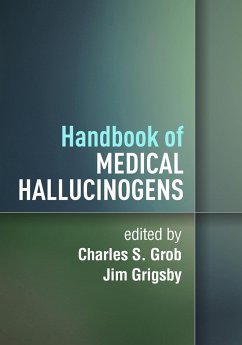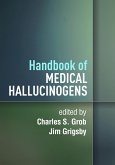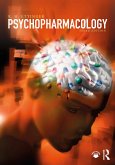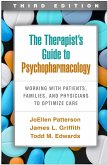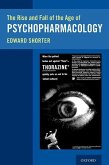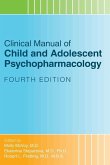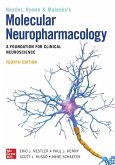Handbook of Medical Hallucinogens
Herausgeber: Grob, Charles S; Grigsby, Jim
Handbook of Medical Hallucinogens
Herausgeber: Grob, Charles S; Grigsby, Jim
- Broschiertes Buch
- Merkliste
- Auf die Merkliste
- Bewerten Bewerten
- Teilen
- Produkt teilen
- Produkterinnerung
- Produkterinnerung
This unique volume focuses on neurocognitive aspects of depression and their implications for assessment, evaluation, clinical management, and research. Experts in the field explore the impact of depression on executive function, learning and memory, working memory, and other critical capacities, and present cutting-edge assessment tools. The neurocognitive effects of antidepressant treatments are reviewed, from psychotropic medications and evidence-based psychotherapies to neuromodulation technologies. Practical aspects of working with adults across the lifespan with depression are addressed,…mehr
Andere Kunden interessierten sich auch für
![Handbook of Medical Hallucinogens Handbook of Medical Hallucinogens]() Handbook of Medical Hallucinogens93,99 €
Handbook of Medical Hallucinogens93,99 €![Psychopharmacology Psychopharmacology]() R. H. Ettinger (USA East Oregon University)Psychopharmacology114,99 €
R. H. Ettinger (USA East Oregon University)Psychopharmacology114,99 €![The Therapist's Guide to Psychopharmacology The Therapist's Guide to Psychopharmacology]() JoEllen PattersonThe Therapist's Guide to Psychopharmacology48,99 €
JoEllen PattersonThe Therapist's Guide to Psychopharmacology48,99 €![Prescribing Mental Health Medication Prescribing Mental Health Medication]() Christopher Doran MD (US University of Colorado School of MedicinePrescribing Mental Health Medication80,99 €
Christopher Doran MD (US University of Colorado School of MedicinePrescribing Mental Health Medication80,99 €![Rise and Fall of the Age of Psychopharmacology Rise and Fall of the Age of Psychopharmacology]() Edward Shorter (Professor of Psychiatry and Pr History of MedicineRise and Fall of the Age of Psychopharmacology62,99 €
Edward Shorter (Professor of Psychiatry and Pr History of MedicineRise and Fall of the Age of Psychopharmacology62,99 €![Clinical Manual of Child and Adolescent Psychopharmacology Clinical Manual of Child and Adolescent Psychopharmacology]() Clinical Manual of Child and Adolescent Psychopharmacology77,99 €
Clinical Manual of Child and Adolescent Psychopharmacology77,99 €![Molecular Neuropharmacology: A Foundation for Clinical Neuroscience, Fourth Edition Molecular Neuropharmacology: A Foundation for Clinical Neuroscience, Fourth Edition]() Eric NestlerMolecular Neuropharmacology: A Foundation for Clinical Neuroscience, Fourth Edition127,99 €
Eric NestlerMolecular Neuropharmacology: A Foundation for Clinical Neuroscience, Fourth Edition127,99 €-
-
-
This unique volume focuses on neurocognitive aspects of depression and their implications for assessment, evaluation, clinical management, and research. Experts in the field explore the impact of depression on executive function, learning and memory, working memory, and other critical capacities, and present cutting-edge assessment tools. The neurocognitive effects of antidepressant treatments are reviewed, from psychotropic medications and evidence-based psychotherapies to neuromodulation technologies. Practical aspects of working with adults across the lifespan with depression are addressed, including ways to strengthen treatment engagement and to incorporate cultural considerations.
Produktdetails
- Produktdetails
- Verlag: Guilford Publications
- Seitenzahl: 582
- Erscheinungstermin: 7. November 2022
- Englisch
- Abmessung: 252mm x 176mm x 32mm
- Gewicht: 922g
- ISBN-13: 9781462551897
- ISBN-10: 1462551890
- Artikelnr.: 65557287
- Herstellerkennzeichnung
- Libri GmbH
- Europaallee 1
- 36244 Bad Hersfeld
- gpsr@libri.de
- Verlag: Guilford Publications
- Seitenzahl: 582
- Erscheinungstermin: 7. November 2022
- Englisch
- Abmessung: 252mm x 176mm x 32mm
- Gewicht: 922g
- ISBN-13: 9781462551897
- ISBN-10: 1462551890
- Artikelnr.: 65557287
- Herstellerkennzeichnung
- Libri GmbH
- Europaallee 1
- 36244 Bad Hersfeld
- gpsr@libri.de
Charles S. Grob, MD, is Professor of Psychiatry and Pediatrics at the David Geffen School of Medicine at the University of California, Los Angeles, and Director of the Division of Child and Adolescent Psychiatry at Harbor-UCLA Medical Center. He previously held faculty positions at the Johns Hopkins University and the University of California, Irvine. Dr. Grob has conducted approved clinical research with psychedelics since the early 1990s and has published numerous articles on psychedelics in the medical and psychiatric literatures, as well as several books. He is a founding board member of the Heffter Research Institute. Jim Grigsby, PhD, is Professor in the Department of Psychology, and in the Division of Health Care Policy and Research of the Department of Medicine, at the University of Colorado Denver. His research and over 250 publications have focused on neuropsychology, cognitive neuroscience, telemedicine, and other areas of health services research. His work in neuroscience includes extensive research on executive functioning and on the clinical phenotypes of fragile x-associated tremor/ataxia syndrome (FXTAS), of which he was a co-discoverer. Dr. Grigsby's current research interests include the the therapeutic use and mechanisms of psilocybin and MDMA.
Preface
I. Overview of Hallucinogens
1. The Pharmacology of Psychedelics, David E. Nichols & Charles D. Nichols
2. Plants for the People: The Future of Psychedelic Therapies in the Age of
Biomedicine, Dennis J. McKenna
3. Anthropology, Shamanism, and Hallucinogens, Michael Winkelman
4. A Short, Strange Trip: LSD Politics, Publicity, and Mythology--from
Discovery to Criminalization, Maria Mangini
5. History of the Use of Hallucinogens in Psychiatric Treatment, Torsten
Passie
II. Neuroscience of Hallucinogens
6. Human Neuroimaging Studies of Serotonergic Psychedelics, Enzo
Tagliazucchi
7. Memory Reconsolidation in Psycholytic Psychotherapy, Jim Grigsby
III. Individual Hallucinogens
8. LSD, Kristine Panik & David E. Presti
9. Psilocybin, Stephen Ross, Silvia Franco, Collin Reiff, & Gabrielle
Agin-Liebes
10. Therapeutic Potential of Fast-Acting Synthetic Tryptamines, Rafael
Lancelotta & Alan K. Davis
11. Mescaline, Will Van Derveer
12. MDMA, Michael Mithoefer & Annie Mithoefer
13. Therapeutic and Social Uses of MDMA, Scott Shannon, Rob Colbert, &
Shannon Hughes
14. Biological and Psychological Mechanisms Underlying the Therapeutic Use
of Ayahuasca, Dráulio Barros de Araújo, Luis Fernando Tófoli, Stevens
Rehen, & Sidarta Ribeiro
15. The Ibogaine Project: Urban Ethnomedicine for Opioid Use Disorder,
Kenneth Alper
16. Salvia divinorum, Ana Elda Maqueda
17. Ketamine, Gary Bravo, Robert Grant, & Raquel Bennett
IV. Therapeutic Considerations
18. Set, Setting, and Dose, J. C. Callaway
19. The Use of Music in Psychedelic Therapy, Mendel Kaelen
20. The Role of the Guide in Psychedelic-Assisted Treatment, Mary Cosimano
21. Comparative Phenomenology and Neurobiology of Meditative and
Psychedelic States of Consciousness: Implications for Psychedelic-Assisted
Therapy, Milan Scheidegger
22. Adverse Effects, Kelan Thomas & Benjamin Malcolm
V. Indications and Purpose
23. Utility of Psychedelics in the Treatment of Psychospiritual and
Existential Distress in Palliative Care: A Promising Therapeutic Paradigm,
Anthony P. Bossis
24. Classic Psychedelics for Treatment of Alcohol Use Disorder, Michael P.
Bogenschutz & Sarah E. Mennenga
25. Psychedelics in the Treatment of Addiction, Matthew W. Johnson
26. The Treatment of Depressive Disorders with Psychedelics, Dave King &
Jonny Martell
27. Hallucinogens in Headache, Emmanuelle A. D. Schindler
VI. Mystical/Religious Experiences and Philosophical Considerations
28. Mystical/Religious Experiences with Psychedelics, William A. Richards
29. Philosophical Considerations Concerning the Use of Hallucinogens in
Psychiatric Treatment, Candice L. Shelby
I. Overview of Hallucinogens
1. The Pharmacology of Psychedelics, David E. Nichols & Charles D. Nichols
2. Plants for the People: The Future of Psychedelic Therapies in the Age of
Biomedicine, Dennis J. McKenna
3. Anthropology, Shamanism, and Hallucinogens, Michael Winkelman
4. A Short, Strange Trip: LSD Politics, Publicity, and Mythology--from
Discovery to Criminalization, Maria Mangini
5. History of the Use of Hallucinogens in Psychiatric Treatment, Torsten
Passie
II. Neuroscience of Hallucinogens
6. Human Neuroimaging Studies of Serotonergic Psychedelics, Enzo
Tagliazucchi
7. Memory Reconsolidation in Psycholytic Psychotherapy, Jim Grigsby
III. Individual Hallucinogens
8. LSD, Kristine Panik & David E. Presti
9. Psilocybin, Stephen Ross, Silvia Franco, Collin Reiff, & Gabrielle
Agin-Liebes
10. Therapeutic Potential of Fast-Acting Synthetic Tryptamines, Rafael
Lancelotta & Alan K. Davis
11. Mescaline, Will Van Derveer
12. MDMA, Michael Mithoefer & Annie Mithoefer
13. Therapeutic and Social Uses of MDMA, Scott Shannon, Rob Colbert, &
Shannon Hughes
14. Biological and Psychological Mechanisms Underlying the Therapeutic Use
of Ayahuasca, Dráulio Barros de Araújo, Luis Fernando Tófoli, Stevens
Rehen, & Sidarta Ribeiro
15. The Ibogaine Project: Urban Ethnomedicine for Opioid Use Disorder,
Kenneth Alper
16. Salvia divinorum, Ana Elda Maqueda
17. Ketamine, Gary Bravo, Robert Grant, & Raquel Bennett
IV. Therapeutic Considerations
18. Set, Setting, and Dose, J. C. Callaway
19. The Use of Music in Psychedelic Therapy, Mendel Kaelen
20. The Role of the Guide in Psychedelic-Assisted Treatment, Mary Cosimano
21. Comparative Phenomenology and Neurobiology of Meditative and
Psychedelic States of Consciousness: Implications for Psychedelic-Assisted
Therapy, Milan Scheidegger
22. Adverse Effects, Kelan Thomas & Benjamin Malcolm
V. Indications and Purpose
23. Utility of Psychedelics in the Treatment of Psychospiritual and
Existential Distress in Palliative Care: A Promising Therapeutic Paradigm,
Anthony P. Bossis
24. Classic Psychedelics for Treatment of Alcohol Use Disorder, Michael P.
Bogenschutz & Sarah E. Mennenga
25. Psychedelics in the Treatment of Addiction, Matthew W. Johnson
26. The Treatment of Depressive Disorders with Psychedelics, Dave King &
Jonny Martell
27. Hallucinogens in Headache, Emmanuelle A. D. Schindler
VI. Mystical/Religious Experiences and Philosophical Considerations
28. Mystical/Religious Experiences with Psychedelics, William A. Richards
29. Philosophical Considerations Concerning the Use of Hallucinogens in
Psychiatric Treatment, Candice L. Shelby
Preface
I. Overview of Hallucinogens
1. The Pharmacology of Psychedelics, David E. Nichols & Charles D. Nichols
2. Plants for the People: The Future of Psychedelic Therapies in the Age of
Biomedicine, Dennis J. McKenna
3. Anthropology, Shamanism, and Hallucinogens, Michael Winkelman
4. A Short, Strange Trip: LSD Politics, Publicity, and Mythology--from
Discovery to Criminalization, Maria Mangini
5. History of the Use of Hallucinogens in Psychiatric Treatment, Torsten
Passie
II. Neuroscience of Hallucinogens
6. Human Neuroimaging Studies of Serotonergic Psychedelics, Enzo
Tagliazucchi
7. Memory Reconsolidation in Psycholytic Psychotherapy, Jim Grigsby
III. Individual Hallucinogens
8. LSD, Kristine Panik & David E. Presti
9. Psilocybin, Stephen Ross, Silvia Franco, Collin Reiff, & Gabrielle
Agin-Liebes
10. Therapeutic Potential of Fast-Acting Synthetic Tryptamines, Rafael
Lancelotta & Alan K. Davis
11. Mescaline, Will Van Derveer
12. MDMA, Michael Mithoefer & Annie Mithoefer
13. Therapeutic and Social Uses of MDMA, Scott Shannon, Rob Colbert, &
Shannon Hughes
14. Biological and Psychological Mechanisms Underlying the Therapeutic Use
of Ayahuasca, Dráulio Barros de Araújo, Luis Fernando Tófoli, Stevens
Rehen, & Sidarta Ribeiro
15. The Ibogaine Project: Urban Ethnomedicine for Opioid Use Disorder,
Kenneth Alper
16. Salvia divinorum, Ana Elda Maqueda
17. Ketamine, Gary Bravo, Robert Grant, & Raquel Bennett
IV. Therapeutic Considerations
18. Set, Setting, and Dose, J. C. Callaway
19. The Use of Music in Psychedelic Therapy, Mendel Kaelen
20. The Role of the Guide in Psychedelic-Assisted Treatment, Mary Cosimano
21. Comparative Phenomenology and Neurobiology of Meditative and
Psychedelic States of Consciousness: Implications for Psychedelic-Assisted
Therapy, Milan Scheidegger
22. Adverse Effects, Kelan Thomas & Benjamin Malcolm
V. Indications and Purpose
23. Utility of Psychedelics in the Treatment of Psychospiritual and
Existential Distress in Palliative Care: A Promising Therapeutic Paradigm,
Anthony P. Bossis
24. Classic Psychedelics for Treatment of Alcohol Use Disorder, Michael P.
Bogenschutz & Sarah E. Mennenga
25. Psychedelics in the Treatment of Addiction, Matthew W. Johnson
26. The Treatment of Depressive Disorders with Psychedelics, Dave King &
Jonny Martell
27. Hallucinogens in Headache, Emmanuelle A. D. Schindler
VI. Mystical/Religious Experiences and Philosophical Considerations
28. Mystical/Religious Experiences with Psychedelics, William A. Richards
29. Philosophical Considerations Concerning the Use of Hallucinogens in
Psychiatric Treatment, Candice L. Shelby
I. Overview of Hallucinogens
1. The Pharmacology of Psychedelics, David E. Nichols & Charles D. Nichols
2. Plants for the People: The Future of Psychedelic Therapies in the Age of
Biomedicine, Dennis J. McKenna
3. Anthropology, Shamanism, and Hallucinogens, Michael Winkelman
4. A Short, Strange Trip: LSD Politics, Publicity, and Mythology--from
Discovery to Criminalization, Maria Mangini
5. History of the Use of Hallucinogens in Psychiatric Treatment, Torsten
Passie
II. Neuroscience of Hallucinogens
6. Human Neuroimaging Studies of Serotonergic Psychedelics, Enzo
Tagliazucchi
7. Memory Reconsolidation in Psycholytic Psychotherapy, Jim Grigsby
III. Individual Hallucinogens
8. LSD, Kristine Panik & David E. Presti
9. Psilocybin, Stephen Ross, Silvia Franco, Collin Reiff, & Gabrielle
Agin-Liebes
10. Therapeutic Potential of Fast-Acting Synthetic Tryptamines, Rafael
Lancelotta & Alan K. Davis
11. Mescaline, Will Van Derveer
12. MDMA, Michael Mithoefer & Annie Mithoefer
13. Therapeutic and Social Uses of MDMA, Scott Shannon, Rob Colbert, &
Shannon Hughes
14. Biological and Psychological Mechanisms Underlying the Therapeutic Use
of Ayahuasca, Dráulio Barros de Araújo, Luis Fernando Tófoli, Stevens
Rehen, & Sidarta Ribeiro
15. The Ibogaine Project: Urban Ethnomedicine for Opioid Use Disorder,
Kenneth Alper
16. Salvia divinorum, Ana Elda Maqueda
17. Ketamine, Gary Bravo, Robert Grant, & Raquel Bennett
IV. Therapeutic Considerations
18. Set, Setting, and Dose, J. C. Callaway
19. The Use of Music in Psychedelic Therapy, Mendel Kaelen
20. The Role of the Guide in Psychedelic-Assisted Treatment, Mary Cosimano
21. Comparative Phenomenology and Neurobiology of Meditative and
Psychedelic States of Consciousness: Implications for Psychedelic-Assisted
Therapy, Milan Scheidegger
22. Adverse Effects, Kelan Thomas & Benjamin Malcolm
V. Indications and Purpose
23. Utility of Psychedelics in the Treatment of Psychospiritual and
Existential Distress in Palliative Care: A Promising Therapeutic Paradigm,
Anthony P. Bossis
24. Classic Psychedelics for Treatment of Alcohol Use Disorder, Michael P.
Bogenschutz & Sarah E. Mennenga
25. Psychedelics in the Treatment of Addiction, Matthew W. Johnson
26. The Treatment of Depressive Disorders with Psychedelics, Dave King &
Jonny Martell
27. Hallucinogens in Headache, Emmanuelle A. D. Schindler
VI. Mystical/Religious Experiences and Philosophical Considerations
28. Mystical/Religious Experiences with Psychedelics, William A. Richards
29. Philosophical Considerations Concerning the Use of Hallucinogens in
Psychiatric Treatment, Candice L. Shelby

